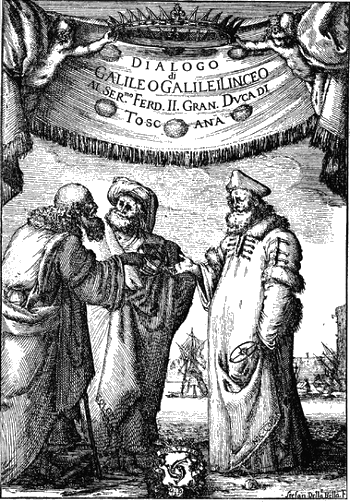
Science and Philosophy
February 9, 2012 Science, as an entity unto itself, diverged from philosophy very late in the western intellectual tradition. When Galileo (1564 - 1642) presented his major and most controversial work, Dialogue Concerning the Two Chief World Systems, he did this as a conversation. This was likely the same manner in which the philospher, Aristotle, conducted his seminars on natural philosophy. Galileo is considered to be the father of modern physics. He used laboratory experiments, a major departure from the philosophical approach, to explicate the workings of the universe. Archimedes' Eureka moment, when he discovered his principle of the displacement of volume in water, was an observation, and not an experiment. | Cover illustration from Galileo's Dialogue Concerning the Two Chief World Systems. The rightmost figure appears to be holding a planetary model in his hand. (Via David J. Wilson/Wikimedia Commons). |
"In the year of our Lord 1432, there arose a grievous quarrel among the brethren over the number of teeth in the mouth of a horse. For thirteen days the disputation raged without ceasing. All the ancient books and chronicles were fetched out, and wonderful and ponderous erudition such as was never before heard of in this region was made manifest. At the beginning of the fourteenth day, a youthful friar of goodly bearing asked his learned superiors for permission to add a word, and straightway, to the wonderment of the disputants, whose deep wisdom he sore vexed, he beseeched them to unbend in a manner coarse and unheard-of and to look in the open mouth of a horse and find answer to their questionings. At this, their dignity being grievously hurt, they waxed exceeding wroth; and, joining in a mighty uproar, they flew upon him and smote him, hip and thigh, and cast him out forthwith. For, said they, surely Satan hath tempted this bold neophyte to declare unholy and unheard-of ways of finding truth, contrary to all the teachings of the fathers. After many days more of grievous strife, the dove of peace sat on the assembly, and they as one man declaring the problem to be an everlasting mystery because of a grievous dearth of historical and theological evidence thereof, so ordered the same writ down."[1]This parable is usually attributed to Francis Bacon (1561-1626), although I could find no reference to it in his writings. One historian makes the comment that "While Bacon does make observations on the heat of horse dung, he is silent on the topic of horse's teeth." The attribution to Bacon is likely made because of his promotion of scientific methods in his native England a little more than a century after the 1432 date of the quotation. This parable illustrates the prime motive of the Aristotelean model of knowledge that persisted for two millenia before the scientific revolution. According to Aristotle, things behaved as they did for fundamental reasons that could be discerned by logic alone. The lure of logic is quite irresistible. You can easily convince yourself that, given the necessary axioms, you can logically deduce anything. However, when your axioms are false, your knowledge collapses as well. The parallel postulate can be viewed as a cautionary example of this. A good review of the nature of axiomatic knowledge can be found in ref. 3.[3]
 The parallel postulate (Book 1, Postulate 5) from Euclid's Elements. (Via Project Perseus). [2]
No, this article is not an anti-philosophy rant. I took as many philosophy courses as an undergraduate as courses in the sciences, and I enjoyed them all. Philosophy and science each have their own dead ends, but much that's worthwhile in the middle. Philosopher, or scientist, you just need to be critical of your beliefs and accepting of better alternatives when they present themselves.
The parallel postulate (Book 1, Postulate 5) from Euclid's Elements. (Via Project Perseus). [2]
No, this article is not an anti-philosophy rant. I took as many philosophy courses as an undergraduate as courses in the sciences, and I enjoyed them all. Philosophy and science each have their own dead ends, but much that's worthwhile in the middle. Philosopher, or scientist, you just need to be critical of your beliefs and accepting of better alternatives when they present themselves.
References:
- Francis Bacon and Horse's Teeth, Quodlibeta, February 16, 2008.
- Euclid's Parallel Postulate, Book 1, Postulate 5, Greek text from Euclid. Euclidis Elementa. (J. L. Heiberg, Leipzig, Teubner, 1883-1888).
English translation by Sir Thomas Little Heath (1956):That, if a straight line falling on two straight lines make the interior angles on the same side less than two right angles, the two straight lines, if produced indefinitely, meet on that side on which are the angles less than the two right angles.
- The analytic-synthetic distinction, Wikipedia.
- Euclid's Parallel Postulate, Book 1, Postulate 5, Greek text from Euclid. Euclidis Elementa. (J. L. Heiberg, Leipzig, Teubner, 1883-1888).